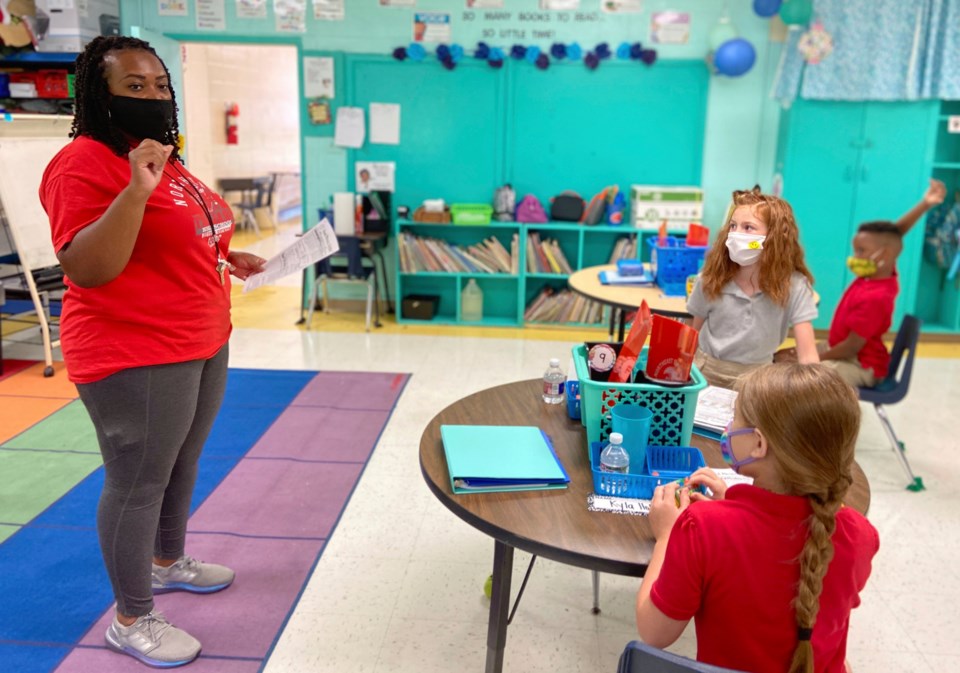Come fall, children will be back in school, where they will have to adjust to new coronavirus normals that will include social distancing, more stringent public health rules and, in some provinces, mask-wearing and teachers dressed in personal protective equipment.
Experts interviewed by Global News say the full extent of the impacts returning to school will have on children’s mental health are not yet known. Returning to school will likely improve the mental health of most children, but University of British Columbia professor Dr. Steven Taylor says getting a definitive answer may take some time.
“The way children react to this pandemic depends to some extent on their developmental level and their understanding of what’s going on. That said, however, there’s lots of variability,” he said.
Most children are “highly robust” and will be excited to get back to playing with their peers, Taylor said. But some will be anxious, and the way that manifests itself can vary depending on the child’s age.
For younger children, in the ballpark of kindergarteners to early grade school, that anxiety could manifest itself in tummy aches, clinginess, increases in irritability, tantrums or developmentally regressive behaviours such as bed-wetting, Taylor said.
For older children, he said the anxious responses could resemble those seen in adults. Older children may “seem to be not themselves,” or be preoccupied, have nightmares or find themselves either losing or gaining larger appetites, said Taylor.
“You get a variety of range of anxiety reactions and it depends on the child’s temperament and other factors as well,” he said.
Parents will play a role
Parents have a surprisingly large impact on how their children will react to going back to school, Taylor added. Some children may be scared of getting their parents sick or have developed separation anxiety, while others may need a refresher on socialization and non-online learning.
According to Taylor, how prone to anxiety a person is depends largely on their genetics and environment. A child who is more prone to getting anxious could see those feelings heightened during the COVID-19 pandemic.
A child living with parents who were constantly panicking or who saw one of their grandparents pass away as a result of the virus, for example, would be more likely to feel negatively about returning to school than a child living with those who remained calm or were able to take their kids to a playground, he said.
“If they’re getting calming, reassuring, accurate information from mom and dad, that could be fine,” said Taylor.
“If they are getting all their news from social media, for example, or getting inaccurate sensationalistic news or watching dramatic stories that exaggerate the threats, then that will heighten their anxieties.”
Kids will need time to adjust
In May, Children’s Mental Health Ontario released the results from an IPSOS poll they commissioned that found more than 59 per cent of parents noted changes in their child’s behaviour.
They said their child had become more irritable, weren’t sleeping well and had become more prone to outbursts, mood swings and persistent sadness, while 25 per cent said their child felt “sad or hopeless” almost every day since the pandemic began.
Dr. Colin King, an associate professor at Western University, said undoing those emotions takes time, adding there will undoubtedly be an adjustment period, particularly for children entering school for the first time.
“They’re going to need some support to get back into a groove,” he said.
While most students will stand to benefit from returning to school, King said some will find that going back to the same types of pressures they experience in classes, and with some students not being at school, may increase stress.
For younger children, he said it will be “especially important” for parents and adult caregivers or teachers to “truly be patient and understanding” and kids get back into their routines and adapt to their new normals.
“There’s going to be a whole range of kids that are extremely excited to be with their friends and then going back to business as usual of what school was like beforehand,” he said.
“We’re going to need to provide a lot of guidance and practice with some of our younger kids here, setting up real new routines around … physical distancing, handwashing and standing in line, in ways that we haven’t done before.”
Try not to panic
For parents concerned about their kids missing out on that new back-to-school feeling, Dillon Browne, a professor with the University of Waterloo, advised calm.
“While adults might be used to how things look after the summer, after an extended period away, these transitions are new for kids every year,” he said.
“It’s going to be new this year. For young kids, it was new last year and it’s going to be new next year again.”
With that in mind, he said parents who have concerns for their kids’ safety and want to keep them learning online, should feel “empowered” to do so.
In many provinces, such as Ontario and British Columbia, parents are calling for class sizes to be reduced. In Montreal, parents have urged lawmakers to mandate mask-wearing in classrooms.
“(Children are) going to be in the right place with the right people. Unfortunately, there’s just gonna be too many of them in one room,” said Browne.
